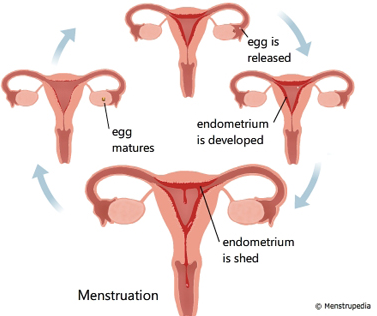Why Your Period Is Not A Code Red
Menstrual blood is where each of our lives began.
Red dots of shame
Why are we ashamed?
To talk about the power our vaginas have!
Have you too felt embarrassed to ask for [insert menstrual hygiene product here] at the medical shop? Have you too used euphemisms like ‘the time of the month’ or ‘monster days’ so that you could talk about your period evasively? Have you too stealthily sneaked pads into your bathroom?
Stop.
It’s time to start talking about your period.
Menstruation or period is the monthly shedding of the blood lining of the uterus through the vagina. It is first experienced by girls when they reach puberty and continues till the time women reach menopause. Menopause refers to the end of menstruation in women and usually happens between the ages of 48 to 55.

Every month, from the time a girl reaches puberty until her menopause, her ovaries release an egg. The ovaries travel through a tube known as the fallopian tube to arrive at the uterus. The blood lining of the uterus, which is known as the endometrium, starts to thicken in preparation to receive an embryo, in case the egg is fertilised by a sperm through sexual intercourse. If the egg is not fertilised before it reaches the uterus, it is lost through the vagina. Since there is no embryo, the endometrium is also no longer required and is also shed through the vagina. This shedding of the endometrium is termed as menstruation.
Simple. Isn’t it?
I wish it was.
Menstruation? HUSH. Wrap it in black packets and disappear with your bleeding vagina – you are impure!
Unfortunately, this simple bodily process is highly stigmatised in society. Women all around the world menstruate every month and yet, there is a screaming silence around menstruation, almost as if we are all pretending that it doesn’t exist.
Menstruation is beautiful. Like the wet soil, so moist and fertile; like the wet soil, that nurtures the seed until it learns to breathe. Menstrual blood is where each of our lives began. Menstrual blood is where we grew from a ball of 32 cells to a baby with a heart that beats and lungs that breathe.
Could it be so impure?
Young girls are often so confused and lost, as their bodies transform during puberty. They turn to their mothers to talk about the blood that oozes out of their vagina, some don’t even know that they are menstruating. Instead of empowering and encouraging words, what do they hear? Silence.
Their mothers teach them what their mothers taught them- to remain silent about menstruation. To hide that sanitary napkin in their pockets as they pull them out of the drawer and carry it to the bathroom. To sleep with caution and walk with utmost care so that stains of womanhood don’t exhibit themselves to the world. To avoid entering the kitchen. To avoid touching other family members. To avoid touching anything divine.
Is there something more divine than what she is being told to hide?
The stigma around menstruation not only makes it difficult for young girls to understand their bodies when they reach puberty but also damages their self-confidence. It infuses them with the idea that they are weak, that they are at fault, and subjects them to anxiety and tension about how they may be ridiculed if the blood shows when they are menstruating.
Why make menstruation feel like a curse?
Menstruation is empowering. Like the protruding Adam’s apple and muscular development, menstruation is power. Blood on your vagina is the embodiment of the power to regenerate and thrive the human species, which you and only you, my women, bear. Knotted blood clots and a dark red flow which they call dirty, isn’t an inch as ugly as their thought. What they deem ‘ugly’, is what nurtured them for nine months. That is something the world needs to be reminded of, that women need to be reminded of.
It’s time. To start talking about your period.
Sara Sethia is a Research Associate (Gender Justice) at One Future Collective.
Featured image: Jasper Oversteyns
Mapping and negotiating power
Uncuff India Episode 10: Dimensions of conflict and peace: visioning a utopian world
Uncuff India Episode 9: Civic space and dissent: A pathway to social justice